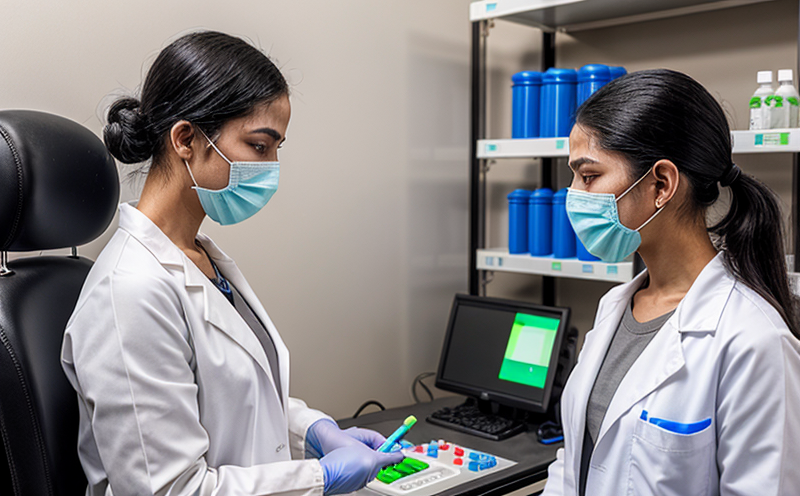In Vivo Micronucleus Assay Testing OECD 474
The In Vivo Micronucleus Assay (MNA) is a pivotal test used to assess the genotoxic potential of chemical substances. This assay evaluates the formation of micronuclei in bone marrow cells, which can be an early indicator of genetic damage or mutagenicity. The OECD 474 guideline outlines stringent protocols for this procedure.
The assay involves exposing laboratory animals to the test substance and then examining their bone marrow cells under a microscope to detect any abnormalities. This process is crucial in pharmaceutical R&D, as it helps identify potential hazards early on, ensuring that only safe compounds proceed to clinical trials.
Compliance with OECD 474 is mandatory for regulatory submissions, particularly when dealing with new chemical entities or drugs undergoing safety assessments. The assay not only ensures compliance but also provides critical insights into the genotoxic profile of substances, which are vital for understanding potential health risks.
The MNA test requires careful specimen preparation and handling to ensure accurate results. Animals are dosed with the test substance under controlled conditions, followed by a precise sampling procedure to collect bone marrow cells. These cells are then stained and analyzed for the presence of micronuclei using advanced microscopy techniques.
Understanding the assay's parameters is essential for quality managers and compliance officers overseeing drug development processes. The use of standardized protocols ensures consistency and reliability in test results, which is critical for regulatory submissions.
The OECD 474 guidelines specify detailed procedures to ensure accurate testing outcomes. These include specific dosing schedules, observation periods, and criteria for cell staining and analysis. Adhering to these protocols guarantees that the assay results are both reproducible and valid, which is crucial for decision-making in pharmaceutical R&D.
The MNA test is a cornerstone of genotoxicity testing, providing valuable information on potential mutagenic effects. This knowledge helps researchers design safer compounds and aids regulatory bodies in making informed decisions about drug approvals. The assay's importance cannot be overstated, as it plays a vital role in ensuring public health and safety.
In summary, the In Vivo Micronucleus Assay OECD 474 is a critical tool for assessing genotoxic potential in chemical substances. Its adherence to rigorous protocols ensures reliable and reproducible results, making it indispensable for pharmaceutical R&D and regulatory compliance.
Applied Standards
| Standard | Description |
|---|---|
| OECD Guideline for the Testing of Chemicals: In Vivo Micronucleus Assay (No. 474) | Provides detailed protocols and guidelines for conducting the in vivo micronucleus assay. |
The OECD Guideline for the Testing of Chemicals: In Vivo Micronucleus Assay (No. 474) is the primary standard governing this test. It outlines comprehensive procedures to ensure that the assay results are consistent and reliable.
Compliance with these guidelines ensures that the test adheres to international standards, which is crucial for regulatory submissions. The guideline specifies dosing schedules, observation periods, cell staining techniques, and analysis methods. Adhering to these protocols guarantees accurate and reproducible results.
Eurolab Advantages
At Eurolab, we bring a wealth of experience in genotoxicity testing, ensuring that our clients receive the most accurate and reliable results. Our team of experts is well-versed in OECD 474 protocols, allowing us to conduct the In Vivo Micronucleus Assay with precision.
Our state-of-the-art facilities are equipped with advanced microscopy equipment, providing high-resolution images necessary for detailed analysis. This ensures that even subtle micronuclei formations can be detected accurately. Our highly trained professionals follow strict protocols, minimizing variability in results and enhancing reliability.
We offer a comprehensive service package, including specimen preparation, dosing procedures, cell staining, and meticulous analysis. Our services are designed to meet the stringent requirements of regulatory bodies, ensuring that your test data is robust and credible.
Our clients benefit from our extensive experience in pharmaceutical testing, which includes genotoxicity assessments. We provide detailed reports tailored to your specific needs, offering insights into the potential mutagenic effects of your substances. This information is invaluable for guiding further research and development efforts.
We are committed to maintaining high standards of quality and reliability in our services. Our clients can trust that they will receive accurate results, compliant with international standards, which are essential for regulatory submissions. Eurolab's expertise and commitment to excellence make us the preferred choice for pharmaceutical testing services.
Quality and Reliability Assurance
At Eurolab, we prioritize quality and reliability in all our services. Our In Vivo Micronucleus Assay OECD 474 is no exception. We maintain a robust Quality Management System (QMS) that ensures every aspect of the assay is conducted with precision and care.
The QMS includes rigorous training programs for our staff, ensuring they are up-to-date with the latest protocols and techniques. This continuous professional development guarantees that we can provide accurate and reliable results consistently. Our facilities are regularly inspected by independent bodies to ensure compliance with international standards.
Our commitment to quality is further underscored by our use of advanced microscopy equipment, which provides high-resolution images necessary for detailed analysis. This technology allows us to detect even the smallest micronuclei formations accurately. Our rigorous quality control measures ensure that every test result meets the highest standards of accuracy and reliability.
We also provide detailed reports tailored to your specific needs, offering insights into the potential mutagenic effects of your substances. These reports are invaluable for guiding further research and development efforts. Our clients can trust that they will receive accurate results, compliant with international standards, which are essential for regulatory submissions.
Eurolab's expertise and commitment to excellence make us the preferred choice for pharmaceutical testing services. We ensure that every aspect of the assay is conducted with precision and care, providing reliable and accurate test data that can be trusted by regulatory bodies worldwide.





